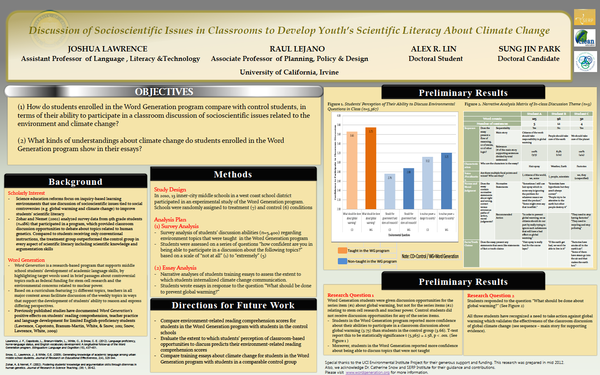Discussion of Socioscientific Issues in Classrooms to Develop Youth's Scientific Literacy about Climate Change
Nationally, the low levels of scientific literacy are reflected in the decreasing number of engineering students and falling test scores among 4th to 8th grade students (NAEP, 2009; NOS, 2000). Declining coverage of science news combined with weak public trust for science is troubling given that citizens should be more involved with policy decisions such as climate change and sustainability (Clark & Illman, 2001). Fortunately, science education reforms focus on inquiry-based learning environments that use discussion of socioscientific issues or science issues tied to social controversies (e.g. stem cell research) to improve students’ scientific literacy. The proposed study seeks to examine students’ understanding about environmental issues, which builds on a growing body of research related to an ongoing literacy program called Word Generation
This study focuses on the potential for deliberative classroom situations for enhancing appreciation of climate change knowledge in adolescents. In particular, we will test the impact of the climate change discussion on the narrative essays that students produce as a part of the program. The study’s objectives are:
- To determine if classroom-based opportunities to discuss climate change has a positive impact on students’ scientific literacy, interest in environmental issues and engagement (e.g. recycling and advocacy)
- To assess the degree to which students’ narrative accounts reflect climate change knowledge
- Test for coherence and discrepancies between student narratives and climate change science
- Inform research in science education and environmental policy to identify reforms to bridge the communication gap between science experts and citizens

